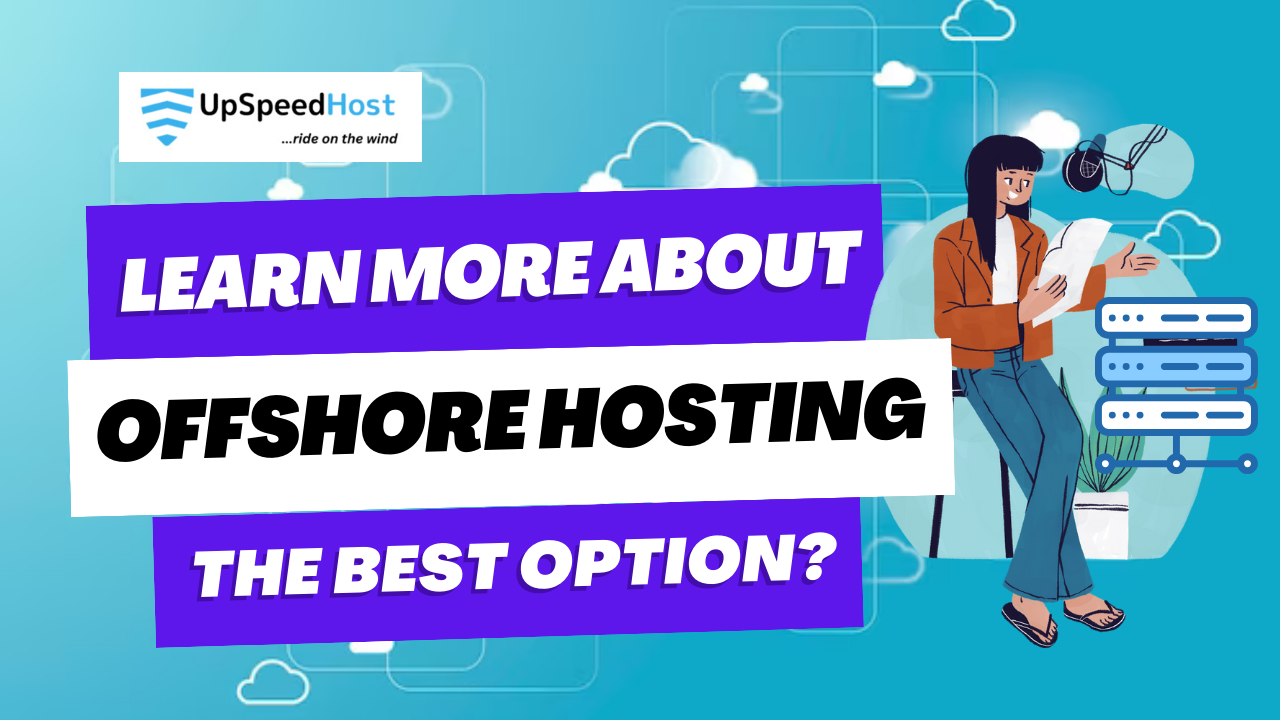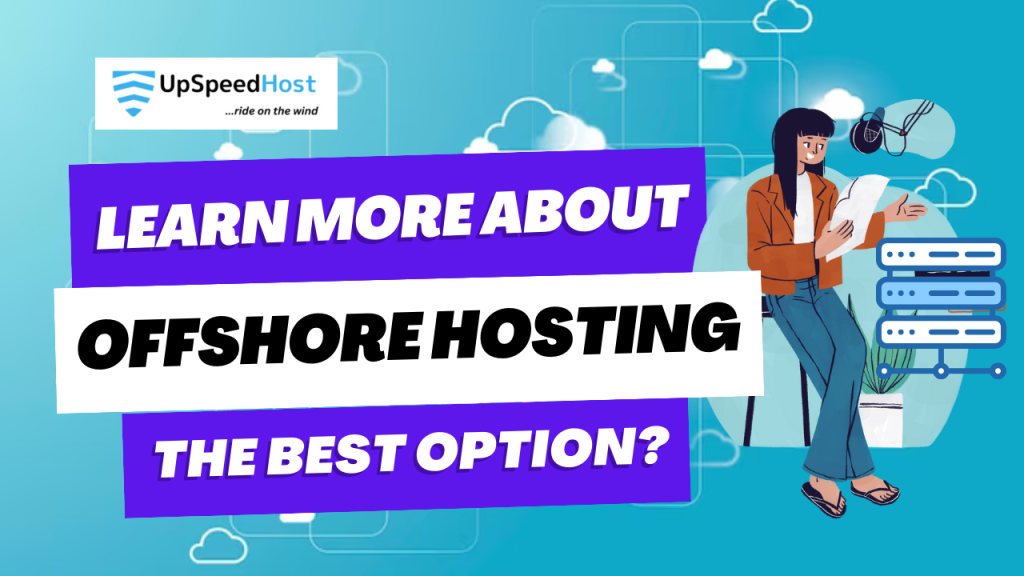Offshore web hosting provides a multitude of benefits, ranging from censorship avoidance to enhanced anonymity. However, not all hosting providers offer the level of privacy and freedom you seek.
When selecting an offshore host, prioritize those that demonstrate a strong commitment to privacy, maintain liberal use policies, and accept cryptocurrency payments like Bitcoin. Furthermore, consider choosing a host located in a country with robust privacy laws, such as the Netherlands.
By carefully evaluating these factors, you can ensure your offshore web hosting experience aligns with your privacy and freedom aspirations.
I can guarantee you that UpspeedHosting will be a good choice for you. But before we conclude on that, let’s know what Offshore hosting means, the benefits and features.
Key Takeaways:
-
Offshore hosting involves locating your website’s data and servers in a country other than your own.
-
This choice offers potential benefits in terms of privacy, censorship avoidance, and cost savings.
-
Careful consideration of legal and regulatory implications is crucial before opting for offshore hosting.

What is Offshore Hosting?
Offshore web hosting is a practice that allows you to store your website’s data and host its operations on servers located in a foreign country.
While technically, any website hosted on servers outside of the website owner’s home country falls under the umbrella of offshore hosting, the term typically implies a deliberate choice to host a website abroad for specific reasons, such as enhanced privacy, protection from censorship, or access to better infrastructure.
Top Reasons to Use Offshore Web Hosting
People typically choose offshore hosting for the following reasons:
- Freedom of Speech: In a world where information is power, the ability to express oneself freely is paramount. Offshore web hosting can provide a sanctuary for those who wish to engage in unfettered discourse, even on topics that might be deemed controversial or illegal in their home country. By hosting your website in a nation with strong protections for freedom of speech, you can operate without fear of censorship or government interference. This is particularly crucial for websites that deal with sensitive issues like politics, religion, or social commentary.
- Avoiding Local Regulations: The legal landscape surrounding online activities can vary dramatically from country to country. What might be considered acceptable in one region could be prohibited or heavily regulated in another. Offshore web hosting can offer a way to navigate this complex regulatory maze. For instance, if your website sells products or services that are deemed illegal in your home country, hosting your site offshore could shield you from potential legal repercussions. However, it’s essential to carefully research the laws of the country you choose to host in.
- Taxes and Legal Residency: Offshore web hosting can also present opportunities for tax advantages and the establishment of a legal business presence in a foreign country. The specific legal ramifications of this are complex and should be discussed with an experienced professional. Nevertheless, the potential benefits can include lower tax rates, reduced bureaucratic hurdles, and enhanced access to international markets. If you’re considering these options, it’s crucial to conduct thorough research and seek expert guidance.
- Anonymous Services: Some offshore hosting providers offer anonymous services, allowing website owners to operate with a high degree of privacy and discretion. This can be particularly appealing for individuals or organizations that wish to shield their identities from public scrutiny. Anonymous hosting typically involves making payments through cryptocurrency like Bitcoin and communicating solely through anonymous email accounts. While this level of anonymity can be advantageous, it’s crucial to remember that it’s not foolproof and may raise concerns from law enforcement agencies.
Problems With Offshore Hosting
While offshore hosting can provide a legal refuge for certain content or business activities, it is crucial to recognize that it does not guarantee complete immunity from regulatory scrutiny.
Consider a scenario where you intend to establish an online gambling site, residing in a jurisdiction where gambling is prohibited. Hosting your casino site on servers located in the Isle of Man, where gambling is legal, may seem like a viable solution. However, even though the site’s physical infrastructure resides offshore, your actions in supporting those activities locally could still be construed as violating regional laws.
If offshore hosting is under consideration, proceed with extreme caution. Carefully evaluate these factors when selecting an offshore hosting provider:
-
Location Restrictions: Mere registration or hosting abroad does not absolve you from potential legal ramifications. Thoroughly research the legal landscape of the host country, as jurisdictions vary significantly in their legal structures and tolerance levels.
-
Industry Regulations: Certain industries may have internal regulations that restrict the type of business activities permissible. Ensure your planned business operations comply with the host country’s industry-specific laws.
-
Privacy Considerations: Many hosting providers tout ‘anonymity’ as a selling point. Verify that this anonymity is genuine and not merely a marketing ploy.
-
Payment Methods: Fiat currencies can easily be traced. For enhanced privacy, consider using cryptocurrencies as a payment option.
Be Cautious
The primary motivation for offshore hosting – escaping government oversight – also harbors inherent risks. Governments determined to monitor your activities will likely find ways to do so. Offshore hosting does not guarantee safety or absolute protection from legal consequences.
When venturing into offshore hosting, prioritize thorough research and meticulous planning. Carefully weigh the potential benefits against the inherent risks, and make informed decisions that align with your specific circumstances.
Essential Offshore Hosting Features To Consider
When selecting an offshore hosting provider, there are several essential hosting features you should consider:
- SSD Storage: Opt for a provider that utilizes solid-state drives (SSDs) for superior performance and reliability compared to traditional hard-disk drives.
- Auto-Installers/Pre-Installed Software: Benefit from ease of installation for popular tools like WordPress, Joomla, or message board software by choosing a provider that offers auto-installers or pre-installed options.
- Database Support: Verify the provider’s support for various database types, including MySQL, MongoDB, and PostgreSQL, to ensure compatibility with your specific requirements.
- KVM Availability: For Linux users, ensure the provider offers kernel-based virtual machines (KVM) to cater to your virtualization needs.
- Unlimited Bandwidth: Seek providers that offer truly unlimited bandwidth without hidden restrictions or excessive usage limitations.
- Robust Data Security: Prioritize providers that demonstrate a commitment to data protection by offering comprehensive security measures and tools.
- Free Domains: For those without a custom domain name, consider providers that include a free domain as part of their hosting package.
-
Add-on Domain Support: Choose a provider that supports multiple domain names if you require hosting for more than one website.
Remember These About Offshore Hosting
When selecting an offshore hosting plan, the primary considerations are payment options (typically monthly or annual) and data center location. Beyond these factors, offshore hosting plans function similarly to standard hosting plans.
Offshore hosting providers offer a variety of service options tailored to specific resource requirements. The most common types include:
- Shared server
- Virtual private server (VPS)
- Dedicated server
Shared servers are the cheapest, but a VPS gets you more resources. Dedicated servers are even more expensive than a VPS but have the highest performance.
Offshore Host Recommendations
If you’re interested in offshore hosting, these offshore hosts have the key criteria we mentioned:
- UpspeedHosting – 99.99% uptime. 24/7/365 support
- KoDDoS – 24/7 live support, Netherlands-based
Frequently Asked Questions About Offshore Hosting
- Is offshore hosting legal?
Yes, offshore hosting is legal in most countries. However, there are some countries that have stricter laws regarding offshore hosting, such as China and Russia. In these countries, there may be restrictions on the type of content that can be hosted offshore, or on how data is stored and processed.
- How is cloud hosting different from offshore hosting?
Cloud hosting is a type of hosting where the website’s data is stored and accessed from a network of servers located in different locations around the world. Offshore hosting, on the other hand, specifically refers to hosting a website on servers located outside of the website owner’s home country.
- Is picking a server in a different country enough to be considered offshore hosting?
Yes, picking a server in a different country is enough to be considered offshore hosting. However, it is important to choose a hosting provider that is located in a country with strong privacy laws and a good reputation for protecting its customers’ data.
- What country has the strictest internet privacy laws?
Iceland is often cited as having the strictest internet privacy laws. The country has a strong tradition of protecting individual privacy, and its laws are designed to protect data from government and corporate surveillance.
- Is offshore hosting different from the dark web?
Yes, offshore hosting is different from the dark web. The dark web is a part of the internet that is not indexed by search engines and requires specific software to access. It is often used for illegal activities, such as drug trafficking and cybercrime. Offshore hosting, on the other hand, is legal and is used by a variety of businesses and individuals.


1 Comment
Thank you for your sharing. I am worried that I lack creative ideas. It is your article that makes me full of hope. Thank you. But, I have a question, can you help me?